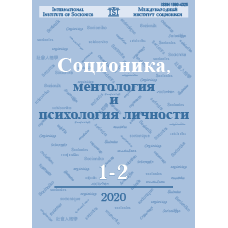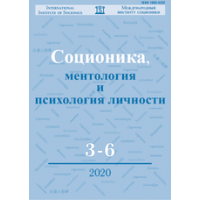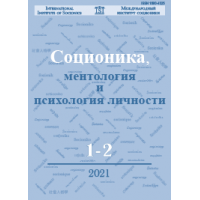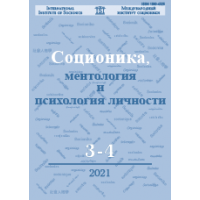Номер № 1-2/2020 журналу «Соціоніка, ментологія та психологія особистості»
Дослідження
Букалов А.В., Карпенко О.Б.
Зігмунд Фрейд і психоаналіз у світлі соціоніки
На підставі біографічних даних, мемуарів та документів проведено аналіз психологічного портрета засновника психоаналізу Зигмунда Фрейда. Показано, що соціонічний тип З. Фрейда – етико-сенсорний інтроверт (ЕСІ). Обговорюється, яким би був психоаналіз та його практика, якби він створювався людиною іншого типу. Розглядається статус психоаналізу та аспекти експериментального підтвердження його положень у сучасній науці.
Ключові слова: психоаналіз, соціоніка, психологія, тип інформаційного метаболізму, Зигмунд Фрейд, До. Юнг, інтроверсія, сенсорика, інтуїція, раціональність, несвідоме, свідомість, глибинна психологія. ;
Розглянуто виникнення та розвиток любові та любовних відносин у соціонічних типів, що відрізняються за ознакою Рейніна "емотивізм-конструктивізм". А.В. Букалову, логіки, етики, любов.
Прокоф'єва Т.М., Прокоф'єв В.Г.
Малі групи «Стилі планування». Частина 3. До практики застосування
Ця частина статті присвячена особливостям практичного застосування малих груп «Стилі планування», як у професійному плані, так і в особистому, зокрема для створення умов якісного повноцінного відпочинку. Стаття буде корисною для соціоніків, управлінців та психологів.
Ключові слова: соціоніка, практика, планування, тип інформаційного метаболізму, тетрахотомія, малі групи, групи релаксації, групи «Квадрат», ефективна робота , повноцінний відпочинок.
Мінаєв Ю.П., Даценко І.П., Пінда М.В., Сафронюк А.С.
Класичні орбітальні тетрахотомії та вербалізовані дихотомії соціону
У цій статті ми продовжуємо повідомляти про результати наших досліджень поділу соціону на четвірки типів, які є «однорідними» з погляду класичних інтертипних відносин. Розглянуто питання про організацію зазначених тетрахотомій соціону за допомогою центральних перерізів соціону, вербалізованих у назвах відповідних біполярних ознак. Обговорюється можливість після першого поділу соціону навпіл наступні поділу кожної з половин здійснювати за допомогою двох біполярних ознак, що відрізняються один від одного. У ході порівняння своїх результатів з результатами інших авторів проводиться узгодження термінології.
Ключові слова: соціоніка, класичні та «ознакові» інтертипні відносини, групи центральних перерізів соціону, біполярні ознаки, Аугустінавічюте – Рейніна ознаки, Юнга – Мінаєва ознаки, «однорідні» та «неоднорідні» четвірки типів, орбітальні тетрахотомії соціону.
Соціонічні консультації
Звонарьова Н.А.
Психологічний аспект у роботі соціоніка
Розглянуто психологічний аспект консультативної діяльності фахівця з соціоніки.
Ключові слова: соціоніка, психологія, консультування.
Питання психотерапії
Литвиненко І.Ю., Шаповалова Л.А.
Теоретико-методологічні проблеми клієнт-центрованої терапії. Частина 1
Розглянуто теоретико-методологічні засади клієнт-центрованої терапії з урахуванням інструментарію типологічного підходу К.Г. Юнга та соціоніки А. Аугустинавічюте.
Ключові слова: психологія, психотерапія, клієнт-центрована терапія, До. Роджерс, методологія, діалектичний метод, системний підхід, соціоніка.
Соціоніка 1-2/2020
- Модель: выпуск журнала «Соционика…»
-
$5.00
- Ціна в бонусних бали: 50
Рекомендовані товари
Соціоніка 3-6/2020
Номер № 3-6/2020 журналу «Соціоніка, ментологія та психологія особистості» Дослідження Б..
$5.00
Соціоніка 1-2/2021
Номер № 1-2/2021 журналу «Соціоніка, ментологія та психологія особистості» Дослідження Р..
$6.00
Соціоніка 3-4/2021
Номер № 3-4/2021 журналу «Соціоніка, ментологія та психологія особистості» Дослідження Л..
$5.00




